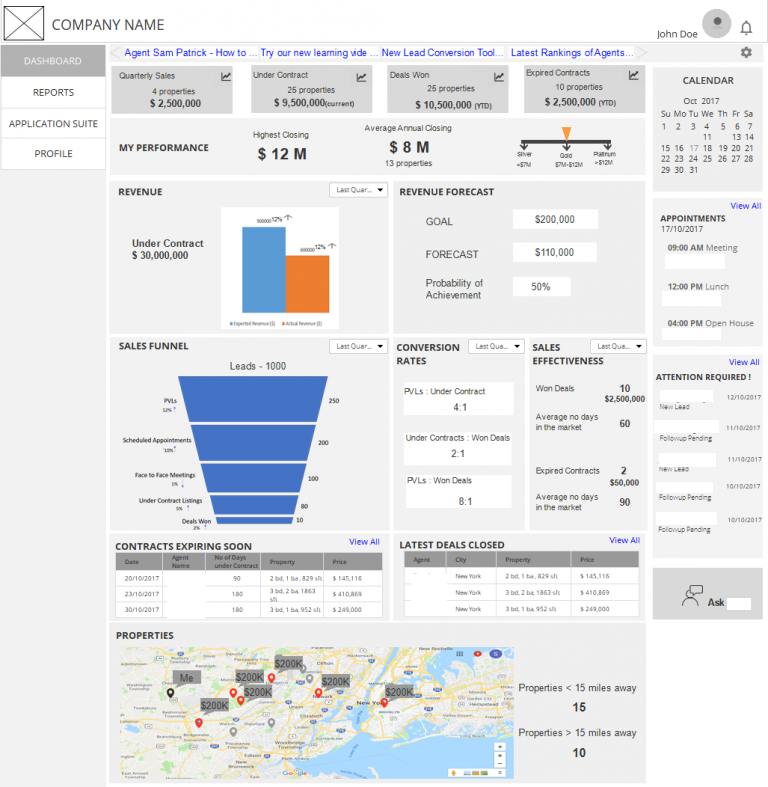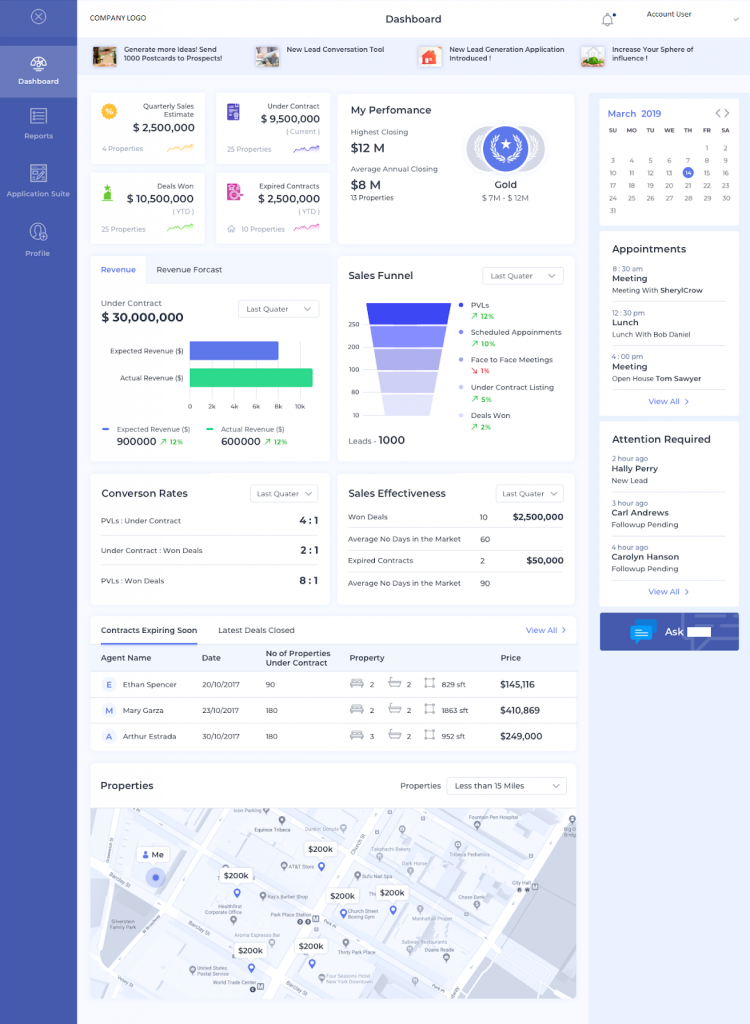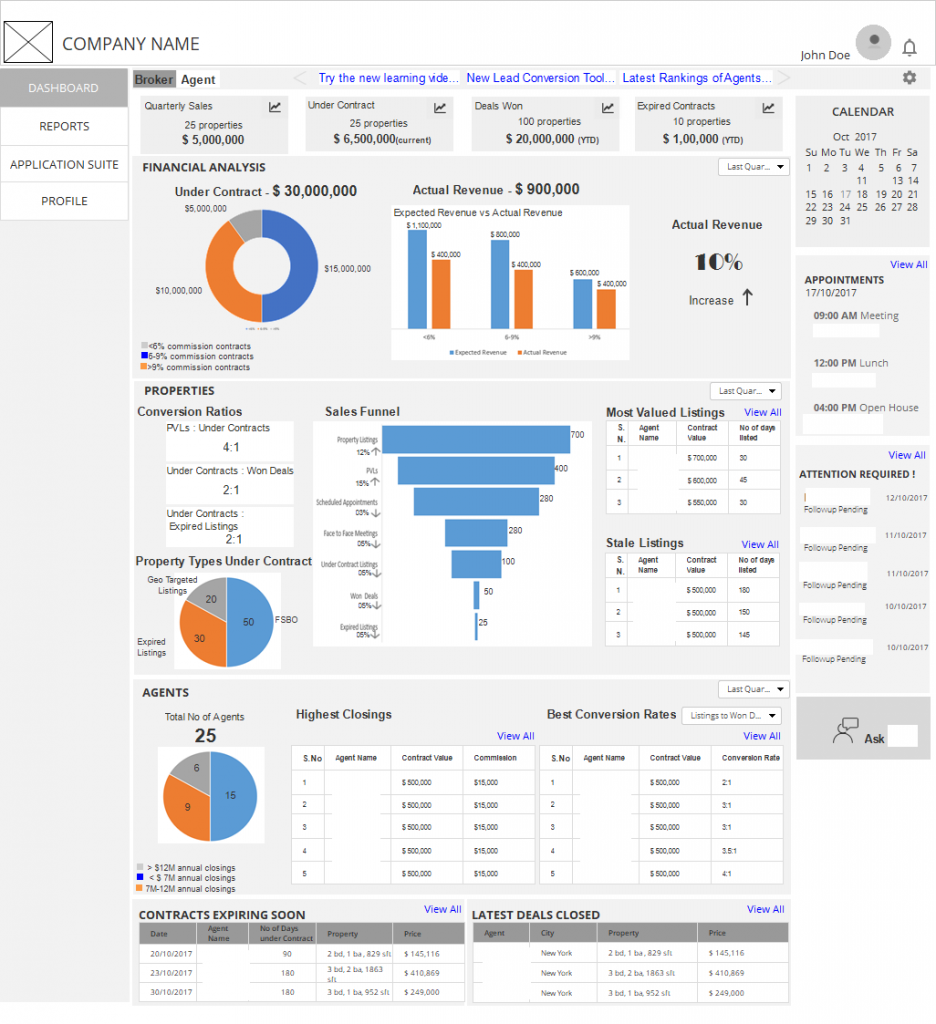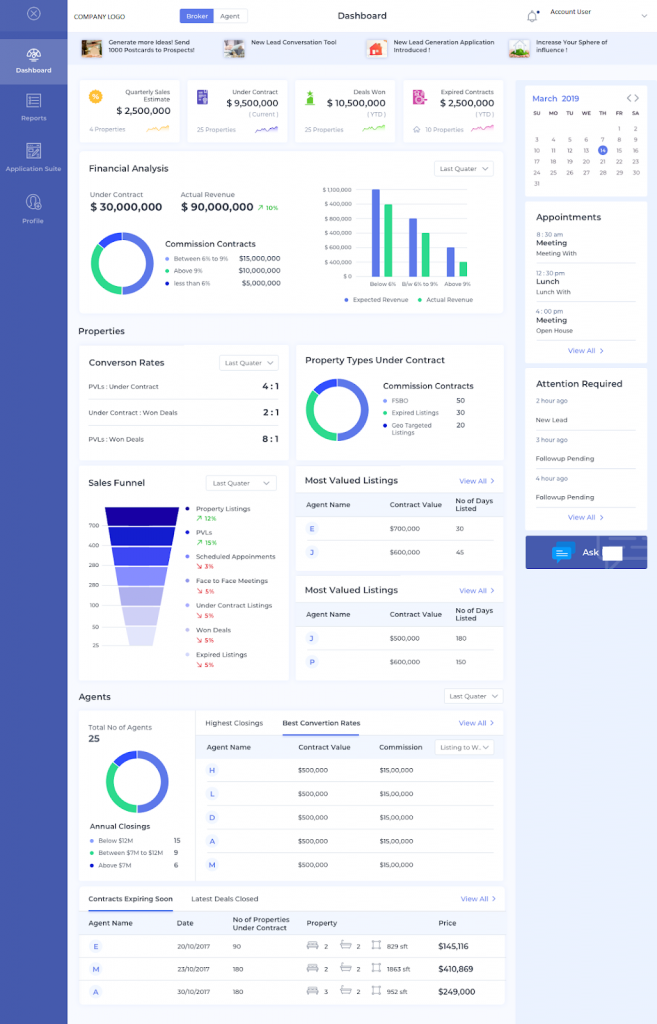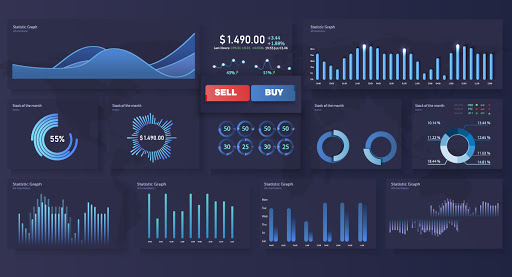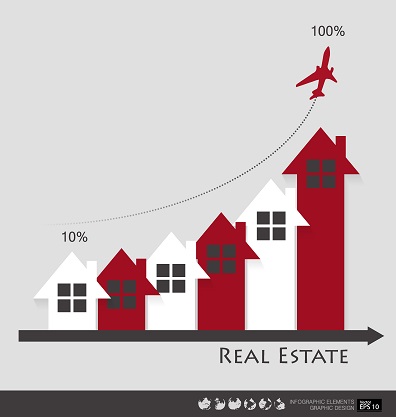Tag: real estate technology
Across the globe, the real estate industry took a hard hit during the COVID-19 pandemic, which left millions jobless. The huge migration of construction workers affected thousands of construction projects. The once-booming realty market experienced a shattering impact.
Not for long! The resilience of the industry paid off. Here is a look at how the real estate industry met the challenges head-on and what is in store for it in 2024.
Meeting the Challenge Head-On
The arrival of the Coronavirus vaccine geared up the real estate segment for yet another phase in early 2021. It realigned itself with buyers’ new expectations. Though the real estate sector has not remained immune to recalibration, it has shown remarkable resilience in the face of the pandemic.
Early 2021 saw a growing thrust toward digitization and technology adoption, beginning a new era in this sector. There has been a significant rise in virtual property events, cloud-based services, digital launches, and much more.
The real estate market is always in flux. It is highly localized with different conditions in different cities, states, and metro areas. Understanding the fundamentals of this segment can help you stay on top of all these changes and challenges that come with the economic downturn. As we gear up for a new year ahead, let’s begin by understanding what factors change the real estate market.
Read more:How Technology Can Solve The Challenges Of The Real Estate
Factors That Will Impact The Real Estate Market In 2024
Though it may be tough to estimate the exact sales volume and value growth, there seem to be enough catalysts to give rise to optimism.
- Real estate prices: Real estate prices are influenced by local buyer demand and the amount of housing supply that is available for buying. Lower rates attract more buyers and vice versa.
- Shifting property needs: The pandemic forced people to spend more time indoors. Hence, there has been a shift in property needs.
- Consumer house-buying power: Affordability is affected by incomes, inflation, and interest rates. When incomes increase, homebuyers might be able to afford higher-priced homes than they could have previously afforded.
- Mortgage rates: Interest rates impact demand, home prices, and affordability. It also fluctuates on factors such as Federal Reserve policy, bond market, inflation, and so on.
- Housing inventory: When housing supply is low, demand is high. This increases sellers’ market. If the supply is high, on the other hand, there will be more buyers to purchase them. This will slow down price growth and the real estate market will remain less competitive.
- Cycles and crashes: Along with the overall economy, the real estate market tends to be cyclical. There will be booms and busts. Fortunately, homeowners today are more financially equipped to handle the loans they have taken.
A Peek Into The Future Of The Real Estate
Among all the sectors, the real estate segment is showing tremendous growth. Here is what we can expect in 2024:
1. Effect of work-from-home on real estate
As the pandemic grinds on, tenant preferences will drive changes in real estate. Many homeowners will gravitate to newer buildings with better ventilation systems and modern amenities like touchless systems.
2. The rise of PropTech and digital transformation
The no-touch scenario has catapulted the innovations of PropTech to center stage. A 3D self-guided tour of the home can be a unique experience. Some real estate firms have put their entire leasing and renewal processes online.
3. Last-mile funding by the government
Governments help for delayed construction projects, along with incentives and attractive payment schemes are attracting homeowners. A fall in interest rates has been an additional incentive. So, developers will continue to witness a surge in inquiries across key real estate segments.
Technologies To Invest In To Remain Resilient
Property technology is booming and changing the way we look at property investments. This digital landscape is allowing both the buyers and investors to view multiple properties without ever having to move out of the comfort of their homes. Here are some examples:
1. Rise of Artificial Intelligence
Artificial Intelligence can accelerate the decision-making process as it aids in asset identification and selection. AI algorithms constantly test the feasibility and effect of different parameters. AI can also help predict any safety hazards or construction defects. This can save a large amount of time and money.
AI’s predictive analytic algorithms can find variations in the demographic pattern of the micro-market. Among many others, it can also detect the income distribution of individuals in the vicinity. This aids in identifying the true intrinsic value of the property.
2. Cloud-based technology
Cloud-based technology assists in the storage of large data. Information regarding properties can be stored and retrieved by stakeholders to answer any customer queries. This lowers manual work and saves time spent in looking for papers.
Read more: A Comprehensive Guide To Modern Cloud Application Development
3. Virtual tour
The spread of Coronavirus restricted movement making it difficult to visit a property in person. However, virtual visits can now be arranged to help buyers make an informed decision.
This allows stakeholders to set up a virtual meeting with the buyer and answer all their questions related to the property. Thus, instead of depending on imagination buyers can now ‘see’ for themselves.
4. Robotic process automation
Robotic process automation (RPA) can be used to automate regular clerical jobs at the site. These jobs may include regulating contracts and approvals between multiple vendors.
RPA enhances the likelihood of more deals being closed. It is more dependable as it significantly reduces human error.
5. Mobile apps
Rental and purchasing mobile platforms have gained popularity in recent times. The real estate industry constantly faces high-level competition. Hence, it demands a digital solution that can aid agents in their work and allow buyers to discover what they are looking for.
These digital solutions can include mobile applications for both agents and buyers. Developing a mobile app can distinguish you from the competition. They increase your chance of being found by your customer before your competition.
Mobile apps are more engaging and can provide a more rewarding customer experience. Customized solutions in the mobile app enable your agents to quicken the sales process.
Proptech Expertise Of Fingent Can Enable Your Business To Remain Resilient
Fingent is well-versed with the complexities that come with the development and implementation of real estate technologies. We are here to understand your idea and turn it into reality. With our expertise, we can create products that are driven by AI, Video conferencing, and more.
Take a look at: How Fingent created an all-in-one property management solution for Rentmoji, a leading Real Estate management firm in the US.
Our dedicated team can offer a wide variety of real estate software services. We strictly adhere to local data privacy and protection policies. We ensure to keep up-to-date with legislation so that apps remain secure and ready to use anytime, anywhere.
Fingent ensures that you are market-ready, armed with competitive technologies. Our experts can help you discover the PropTech potential in your real estate business. We have hands-on expertise and skills in the industry. We can collaborate with you and tailor software to your specific needs.
Fingent is equipped to create the most sophisticated and stable applications that meet your requirements. By partnering with us will enable you to use real estate software that is a perfect fit for your business values and expand your market scope. Drop us a line and let’s discuss your needs.
Stay up to date on what's new

Featured Blogs
Stay up to date on
what's new



Talk To Our Experts
Adoption of Predictive Analytics
The Commercial Real Estate (CRE) industry is growing. New business models and competition, extensive use of technology, and changing tenant and investor expectations are redefining the face of this industry. Each year brings new technologies that alter the way agents approach their work. As investors are ready to change their business models with a tech-enabled ecosystem, CRE companies and agents will have to adapt to the new demands and technology trends. The market will remain wide open only for those who are ready to accept the change and adapt to new technologies.
Get to know how smart home technology impacts real estate.
This video is made using InVideo.io
Based on the industry market research report on the state of the commercial real estate industry in the US, there are almost 1.3 million properties with an average sales volume of $55 billion. Over the past five years, the commercial real estate industry in the US has grown by 2.6% to reach revenue of $1 trillion in 2019. Moreover, it is estimated that the CRE industry expansion is expected to continue over the next five years.
“The CRE property values (specifically NNN properties) are unique in that the pricing is not driven strictly by the underlying real estate, but also by the lease terms and a single tenant’s credit rating”, says Camille Renshaw, co-founder, and CEO, B+E. This shows the relevance of analytics in tenant/property data.
Related Read: How Real Estate Technology Helps Predict Property Prices
Predictive Analytics Occupy a Pivotal Role in CRE
No investor cares about what the property meant in the past. They are keen to know about the future of the property or how its potential value will escalate in times to come. Here comes the significance of PREDICTIVE ANALYTICS, which uses past and present big data to make reliable, proof-based predictions about the future development of a property.
CRE is an industry sector that contains an abundance of data. Over the past years, analytics are slowly taking up its role among numerous listing sites. Its chief role is to provide both buyers and sellers more context about the property and its qualities. However, analytics that really benefits CRE agents is still a rare thing to find. This is where predictive analytics comes into place.
Predictive analytics tracks consumer (basically buyer/seller) behavior to understand the conditions in which they are most likely to buy or sell. This helps an agent to better utilize their time and resources, which in turn maximize the overall sales. It is expected that over the next few years the adoption of predictive analytics in the real estate industry will accelerate. Besides, studies also show that predictive analytics is one among the many real estate technology trends to follow in 2019.
CRE companies/agents can achieve clear and practical insights for different strategic actions that they must adopt by combining data from different sources and advanced analytics technologies. This includes predictions like analyzing the tenant’s benefits due to flexible leases, customer and traffic information for a retail center or staff usage information for office space, etc.
Features like heatmap analysis, property rental calculators, projected revenue charts, return during lease analysis are a few examples of predictive analytics that agents generally use to showcase how a property will perform in the future and its possible return on investment.
Related Reading: Check out how Fingent provided integrated Prop-Tech Solution for real estate brokers.
How Predictive Analytics Benefits the CRE Industry
Predictive analysis allows an agent to suggest the perfect property that matches their investor preferences, expectations, and goals. This saves time and risk by providing the investor with a reliable return on investment metrics based on past and present data as well as the future expected trends of their investment.
It also allows the agent not to have any specific financial background, as the analytics platform does its job to suggest a property that guarantees to provide its investors with positive cash flow and high return on investment.
It is possible to carve analytics, which can even identify the ability and education levels of possible agents from a list and suggest it to a CRE company based on use cases.
Many AI-based applications help its agents or even investors to get a detailed and personalized report by simply providing basic information like area, the fund available, risk level, expected CAP rate, etc.
In addition, such tools can even be customized for agents that will give them answers to queries like:
- Is this the right time to invest?
- What would be my ROI – maybe in the next five years?
- Neighborhood status and track record?
- How much is my existing portfolio worth?
Such predictive recommendation engines have proven to foster deeper engagement and increase ROI. For instance, Amazon’s predictive recommendations had a success rate as high as 60% in some cases.
Related Reading: The Impact Of Big Data Analytics and How it is Changing the Real Estate Industry
As a CRE Company, What Must We Do?
Developing an enterprise-wide strategy and supporting it with a sound technology core has turned out to be important for a commercial real estate company. This must be supported by data gathering and analytical techniques. According to the CIO surveys performed by different agencies, only one-fourth of organizations globally across industries have currently in place an enterprise-wide digital vision and strategy.
A solid technology strategy that is spread across the industry stands as the first step towards effective technology deployment and integration. More efficient utilization of IT budgets and resources also needs to be considered. This will include evaluation of how data capturing is performed, use of predictive analytics, advanced tracking and reporting management AI tools. A well planned and phased deployment of technology will likely yield amazing results than waiting for your turn and jumping into the development and implementation process.
However, there are a few things that require consideration before starting to work with a PropTech company. A CRE company must admit the fact that, when starting off working with a PropTech firm, they must not consider them just as vendors of a product or service, as this can very well limit the range of benefits that the company can achieve.
Instead, try partnering with them on potential innovations. Identifying a single point of contact to take up conversations with PropTech and a coordinated approach supported by guidelines to evaluate the features developed must also be taken into consideration. In addition, make sure that the size, scale, maturity, level of innovation, and relevance to existing business is conveyed properly to the PropTech company.
Commercial real estate technologies are relatively new and most of the PropTech companies are only beginners in the CRE Industry. They tend to make decisions quickly compared to CRE companies, which can end up delivering wrong results or create anomalies in the process flow. A shared understanding must be developed by the partnering company to allow successful coexistence.
Related Read: Top Technology Aids To Accelerate Real Estate Growth
Predictive analytics is transforming commercial real estate by enabling stakeholders to make data-driven decisions, identify risks and opportunities, and optimize operations. To leverage the full potential of predictive analytics, commercial real estate firms need a reliable partner like a custom software development company. Such a company can provide customized solutions that integrate predictive analytics tools with existing systems, unlocking actionable insights that can drive business success.
Stay up to date on what's new

Featured Blogs
Stay up to date on
what's new



Talk To Our Experts
Imagine you are a salesman and you have logged into your system with the dashboard pulled up in front of you. Viewing the dashboard with a horde of information on it can turn out to be a very overwhelming experience. Bar charts, pies, metrics, numbers, arrows, percentages, ratios and what not go swimming in front of your eyes. Do they make any sense or do they end up confusing you? Does it include an intuitive interface allowing seamless navigation or is it cluttered and poorly organized? Well, it all depends on how well the sales dashboard is designed.
Recently, Fingent was approached by a client to develop a sales dashboard for their customers who are real estate agents and brokers. The requirement was to develop a portal for the agents and brokers to log into and a dashboard which gives a snapshot of their business performance. With this real estate platform, realtors should be able to access third-party applications to help them with the various stages of their business process.
Related Read: The Tech Disruptors in the Real Estate Space: What to Implement First?
Fig 1. Wireframe of Dashboard Designed for a Real Estate Agent
Fig 2. Sample Mockup Designed for a Real Estate Agent
In the real estate industry, data is often unstructured and unaccounted. This platform allows agents to prospect leads, manage and follow up on them, view the status, close on them and ultimately account for the costs and commissions.
Fig 3. Wireframe of Dashboard Designed for a Real Estate Broker
Fig 4. Mockup Template Created for a Real Estate Broker
Expectations from a Good Sales Dashboard
A well-designed sales dashboard is like a good storyteller. It tells you a story complete with the setting, the characters, the main plot, the conflicts, and a conclusion. This should all flow in a seamless, logical way as the eyes of the user move from the top of the dashboard to the bottom; gauging information, which is crucial to making accurate decisions.
Salespeople usually juggle with a lot of numbers. They have numbers related to revenue, sales pipeline, products and services, customer base, forecasts, financial data etc. These numbers help them analyze and make critical decisions on the next move to steer their business forward to success. If these numbers are all scattered around, a salesperson may end up spending precious time gathering data and in the process slip on making important decisions.
Now, imagine if all these numbers come across as a story. Accordingly, the salesperson is able to quickly view the Key Performance Indicators (KPIs) of their business, make a conclusion and plan for the next moves. That is what a good sales dashboard aims to achieve.
A good sales dashboard gives an unbiased true picture of the day to day workings of one’s business. It provides an illustrated view of KPIs and other information crucial in the sales process.
Related Read: Ok Seriously, How Important Is Data Visualization?
Besides, a well-designed sales dashboard should also offer access to real-time data. With this real-time data, salespeople can continually monitor the sales pipeline and activities for making crucial decisions.
The design is yet another leading factor in ensuring better user experience. The logical arrangement of the metrics and other information contribute to effortless navigation all the while ensuring that the most important information is accessed first.
Designing a Sales Dashboard
Now, on the other hand, designing a sales dashboard is an equally daunting task. How do we represent all those numbers in a visually pleasing and logical manner? Furthermore, which numbers to choose from the many, that would ultimately matter the most to the client.
Keeping in mind the following tips will help you design an effective sales dashboard.
1. Getting Your Story Right
A good understanding of the client’s business and its KPIs will help you build the story. Identifying the pulse of the business by tapping on which will give you a correct understanding of the business’s lifeline is the key. Following are some metrics that are generally used in sales –
-
Revenue
This is the key indicator denoting how well the business is doing. Revenue is compared over time (monthly, quarterly, yearly) or with the projected versus actual revenue. It can also be compared to the costs and expressed as a return on investment (ROI). Another way of representing it is to show profits after all the costs are deducted from the revenue. Finding out from your clients which figure would best be useful to them will help you in the design.
-
Forecast
The client can integrate a system to predict their future sales and revenue based on their past backlog, current pipeline, employee performances, market conditions etc. Showing this data on the dashboard will help them see the direction their business is taking.
-
Sales in Numbers and Value
From where is all the revenue coming? Is it from just one product or are all the departments making enough sales? These questions can be answered by displaying the sales in numbers and value. This will give more clarity on the inner workings of the client’s business.
-
Sales Pipeline
The sales pipeline reflects the number of deals in each stage of the sales process. The stages can be open leads, qualified leads, face to face meetings, proposal stage, and closed deals. The number of deals in each stage will help the salesman asses whether they have enough incoming leads to sustain their business, and also whether they have an appropriate distribution of deals to meet their sales targets. It also helps in forecasting revenue in the near future.
-
Lost Deals or Backlog
Negative metrics such as the number of lost deals or the backlog from the previous financial cycle, on the dashboard help in critical decision making. It can tell the salesman where their business is lacking and what it is that they need to focus on.
-
Conversion Ratios
Conversion ratios tell the efficiency of the various stages in the sales process. Numbers such as these – the ratio of open leads to qualified leads, the ratio of qualified leads to closed deals, the ratio of open leads to closed deals etc. help in understanding where the work is getting piled and identifying the bottlenecks faced in the business.
-
Attention Required/Overdue items
Salespeople would appreciate if they can get hold of a list of items on the dashboard, which needs their immediate attention. Overdue tasks is another area which needs to be highlighted in the day to day functioning of the business.
-
Performance
A metric that reflects the sales effectiveness or achievements of a salesperson in line with the company strategy and targets would summarize their performance and also act as a motivating factor to push them towards achieving more.
2. Making Data Comparisons for Deriving Insights
One can gather meaningful insights from data when a comparison is made. Therefore, the way these metrics get compared side by side to derive a logical conclusion is downright important.
Should the metrics be compared with respect to each other? For example actual revenue against forecasted, lost deals versus won deals, sales backlog against the pipeline etc.
Or should it be compared with respect to time? Daily, weekly, quarterly, year on year, year to date etc. Making a comparison should ultimately help the salesperson answer the right questions.
3. Building your Story on Actual Data
Getting real-time data is really helpful in determining the best way of representing it. If it is fictional data, then one must stick to keeping the proportions right. Each chart has a specific type of data that it represents. For example, a pie is used to represent parts of a whole, a funnel represents a progression and a line displays variation over time of different series.
When you use actual data, you tend to realize that some charts do not look as good as you expected and maybe you should think about representing it in some other way. Or, that some numbers are better off shown as numbers itself and not compared to other figures as part of a chart, because it might end up skewing the chart in one direction.
4. Following General UI/UX Principles
Following the general UI/UX principles of good design makes the dashboard visually pleasing and easily navigable. Since most people read from left to right and top to bottom, aligning the widgets on the dashboard in the same order as the story progresses, helps in seamless navigation. The top left space on the dashboard is where the eye falls first. Placing the most important piece of information there ensures high visibility.
Leaving enough white spaces and keeping the dashboard uncluttered will help the user assimilate the information better. A sales dashboard should be concise with just the right amount of information for the salesperson to make an assessment of their business.
5. Keep Reinventing
Nobody gets it right the first time. Redesigning the dashboard a couple of times gives you a better perspective each time and helps you discover the one which will ultimately win your client’s heart.
Related Read: Make Your Data Visualization go Viral: 10 Quick Tips
Wrapping Up
Bringing things into perspective or distilling the essence from a mix of information is what a sales dashboard is all about. Companies have been relying on such visual representations to get an overview of what needs to be done. Particularly in the area of sales, such close visualizations of a range of data can indeed prove helpful for salespeople to gauge information as it is intended and make decisions crucial to the sales process. Owing to its importance, it is downright necessary to build and design a sales dashboard in accordance with certain principles.
By taking into consideration the key metrics that define the sales process, it is possible to delineate the entire workflow and pipeline to an easily identifiable visual form. Such a dashboard brings more clarity in the process, enabling salespeople to understand and apply the necessary changes. We did just that with our client by formulating an effective sales dashboard. This would ultimately help them leverage sales data to contrive practices that push their business forward, all the while accelerating efficiency and ROI.
Stay up to date on what's new

Featured Blogs
Stay up to date on
what's new



Talk To Our Experts
Over the years the real estate market has witnessed a tremendous change in the way it runs the business. Intense market competition has compelled the real estate firms to rethink traditional strategies and innovate. Therefore, modern realtors are considering various real estate innovations as opportunities to build up their valuation.
One such innovation prevailing in the real estate market today is the concept of an amenity-packed mobile app. Applications connecting tenants with a pool of amenities are the latest makeover tools adopted by realtors. These apps are now the trending treats offered by real estate companies to retain their existing tenants and attract new ones.
Amenity Apps – The Next Big Thing In Real Estate Market
Recent reports have revealed that the vacancy rate of offices in New Jersey and Westchester County, has increased to 20%. Even the overall vacancy rates of Manhattan is above 8.5%, approximately. With such high vacancy rates in the most competitive real estate markets, realtors have realized the need to adopt differentiated strategies to retain tenants. Hence, realtors are now stepping out of their specialty to foster services beyond the boundaries of property business. The most innovative approach through which builders are now keeping their buildings 100% leased is by introducing amenities.
Why Amenity Apps?
In today’s world where competition is at its peak, workers often fail to maintain a work-life balance. While striving to beat the nerve-racking competition of the modern world, employees are missing out on the necessary routines of life. Regular exercises, health checkups, haircuts, laundry or even picking up a meal becomes a hassle when work is tough.
Realizing these challenging situations of today’s workforce, some prominent realtors like Tishman Speyer and Sterling Bay, created amenity apps for their employees in New York. These apps are helping the workers to achieve a balance between personal and professional life. With these apps, property builders are extending their services to bring in amenities to the doorsteps of their customers.
Life hacks provided through prompt mediums like mobile and tablets are making buildings more attractive for tenants to stick on. Extending real estate services to provide better lives for tenants are not only upgrading the value of buildings but are also turning office markets to service businesses.
Related Reading: How Top Real Estate Companies Leverage Technology to Soar New Heights.
How To Woo Tenants With The Perfect Amenity App?
With amenity apps creating a hue in the real estate market, property builders are striving to introduce spellbinding services through innovation. Office landlords and building owners are integrating technology with small-scale businesses to woo their tenants. But to create an impact in the market, it is necessary to load these amenity apps with captivating features. To help realtors deduce the best amenities for their apps, here’s a short list of the popular ones that are boosting the customer retention rates for some leading real estate enterprises. While food services have already become the baseline of several amenity service apps, few other amenity types are also achieving an eminent position.
Health & Fitness
With healthcare activities gaining popularity among the current young workforce, several real estate firms are loading their amenity apps with wellness services. On-suite fitness programs like massages, meditation, yoga, and other healthcare programs are the prominent features of multiple amenity apps. hOm introduced by the Brookfield Property Partners is one such innovative example of technology-packed amenity provider that offers unique fitness events to create healthy communities.
Closer Communities
Leading real estate providers are trying their best to create active and lively communities. Lack of time and rush life often makes it difficult for residents to engage well with their neighborhood. With a motive to diminish such hostility and create more engaging communities, property builders are now incorporating emerging technologies to implement amenities that bring people together. Services like group discussions, ride sharing, community meetings, travel management, human resource services, etc. are attractive features of amenity apps.
Access to Building Amenities
Gated communities often extend a wide range of amenities for their residents. Generally, these amenities are offered through common communication channels like emails and telephones, which makes it difficult for residents to reach them. Hence, property owners are now featuring portals to bring these building services closer to tenants. Recently Silverstein Properties introduced the Residential Community App which allows tenants to access rent payments, tenant referrals, community and neighborhood maps, shuttle services, discounts, offers and much more through their smartphones and tablets.
Eco-Friendly Environment
With the increased concern of protecting nature, property owners are now focusing on amenities that serve both tenants and nature. The SL Green Realty Corp., initiated a suite called SL Living Green that connects residents with group discussions, educational talks, recycling projects, eco-friendly waste disposal schemes, etc. to enhance their wellness and style of living. These amenity features allow tenants to feel responsible towards nature which attains them a unique experience.
Other Popular Amenities
Few other personal styling and emergency medical care amenities are popularizing among tenants. Medical aids like backup child care, health screening, drug delivery etc are some of the highly accepted medical features of amenity apps. Also, few real estate firms are designing their amenity apps to deliver styling amenities like blowouts and manicures, shoe shining, hair styling etc. to desired locations.
Related Reading: Self Showing App, an IoT application built by Fingent streamlines the complete inspection and leasing procedures of real estate firms. Find more in the case study here.
How Are Real Estate Amenity Apps Winning Hearts In New York?
Isolated lives of metropolitans have marred the quality of life. The struggles to socialize, stay fit and even to groom well, are becoming the increased concern of the modern generation. Hence, the leading real estate firms are empowering their amenity apps with services to sort these hassles of the modern world. One such enterprise is Tishman Speyer, who has integrated technology with small-scale services to create unique experiences for its tenants.
Tishman Speyer, a diversified real estate firm operating properties of worth $89 billion, including the iconic Rockefeller Center in Manhattan, rolled out an app called Zo. The Zo. app is winning hearts in New York, by exclusively connecting its employees to an unparalleled collection of services. They offer exclusive deals which include wellness programs, social and interest group gatherings, backup childcare, on-site health screening, and medical services, dry cleaning pick up and delivery, personal styling, individual meal delivery, catering, and much more. These services are enhancing the living standards of Tishman workers and tenants by creating a hassle-free work environment for them.
Another leading real estate developer in New York, entering the emerging war of landlord amenities is Sterling Bay. They have introduced their own app offering expanded eye-catching amenities for their workers.
Extreme competition in the real estate market is determining the growth of property businesses on the basis of the number of people in it and not by the square footage. More than magnificent buildings, residents are now attracted to communities that deliver unique and lively environment. Tenants prefer buildings that provide amenities through advanced technology channels that enhance the living experience. Incorporating smarter technologies and utilizing real estate software, is emerging to be an essential ingredient in real estate business today.
With emerging technologies transforming communities, the real estate market is witnessing a new era of property services beyond bricks and mortar.
Related Reading: A Property Management Software can be a boon for real estate managers if adopted the right one. Find the secrets of finding the right property management software here.
Read More: Mobile App Development : 4 Tips To Consider
Stay up to date on what's new

Featured Blogs
Stay up to date on
what's new



Talk To Our Experts
The Real-World Conference has established itself as the go-to conference for the real-estate industry, attended by a host of industry leaders, resource persons, and key movers and shakers in the real estate and property management space. The latest edition of this premier realty and property meet, which took place between 16th July and 18th July 2017 at the Wynn Hotel in Las Vegas, USA, lived up to its tagline of “a sign of good things to come.” The host of informative sessions, roundtables, and training workshops on offer, by industry leaders and topic specialists, enriched participants with rich insights on the latest industry trends, training on valuable skill-sets, and exposure to practical case studies applicable to real properties.
Related post: Top Tech disruptors in the Real Estate industry – What to implement first
Enriching Sessions Keep Participants Up-to-Date
The RealWorld conference is noted for its host of innovative sessions, and RealWorld 2017 was no different. Several sessions, dealing with customer experience, marketing, internal processes, leasing, risk management, and more, offered a host of valuable resources for those in the property business.
A session on “Accounting & Asset Investment Management, Financial Solutions to Run Your Business” offered insights on the tools required to support relationships, effective reporting, and diverse technology unique to the business. It reviews a host of solutions designed specifically for real estate investment firms and asset management professionals, including what’s new.
Another intuitive session “The Latest in Commercial Property Management and Portfolio Asset Management Solutions” offered insight on the right tools and techniques to make sense of the wealth of incoming data every day, how to collect the most relevant data, how to consolidate and analyze the information in shared reports, and more.
The latest trends such as daily pricing, complex floor plans, and internet listing services make the time-honoured practice of keeping track of competition a very complex task. The “session on Tracking Your Comps” offered valuable information on the most relevant best practices and methods, and overview of the new tools which allows coping with new challenges, how to use data efficiently, and much more.
Related post: Infographic on Impact of Big Data in Real Estate
Another session, “Splitting the Atom: Using Data Science to Delineate and Turbocharge Marketing & Sales” offered rich insights on how to evaluate the quality of leads, how to use business intelligence in decision-making the right way, and more.
Yet another session which stood out was an educational session, where multi-family panelists interacted with apartment residents from the greater Las Vegas area. Property managers gained valuable insights on real-world scenarios related to what renters want, the impact of communication and reviews have on leasing and renewal decisions, and much more. Another standout session brought together residents and managers, discussing the issues related to safety, noise, parking and social interaction in property spaces.
These sessions, apart from providing property managers and other stakeholders with rich insights on real life practical issues and grouses of apartment residents, also drives home a point of how a community portal, used the right way, could strengthen the bond between landlord and renter. Today’s residents expect real-time conversations and instant decisions related to critical issues that matter, in the communication mode of choice. The speed and nature of the property management’s response to such issues and requests can have a big say in rental renewals and even new referrals. In such a scenario, a platform that allows identifying and tackling critical issues in a much more systematic and coherent manner, as opposed to public grumbling in social media sites, is invaluable.
Exhibitions Help Participants Stay Aware and Use New Technologies
Apart from a host of informative sessions, RealWorld2017 also features several top exhibitors, offering insights on new ways of doing things, path breaking innovations in the industry, products, and solutions to improve productivity and save money, and overall become more efficient. The exhibition connected to the event offers a ready source of access to the latest and the most advanced products and providers in the real estate space.
Networking in the Name of the Success Game
Apart from enriching themselves with the latest knowledge, insights, trends, and best practices, participants also gain through networking with the top industry leaders, peers, service providers, and other stakeholders in the industry. Participants get a valuable break to kick-start a fruitful relationship with key contacts that matter and sustain the engagement through social media and other industry portals. The RealWorld conference also offers valuable opportunity to build on existing relationships. Smart participants use the time to reconnect with their previous contacts over a cup of coffee.
Most conferences run for a couple of days, and participants with a goal to introduce themselves to, say 10 people each day, providing some encouragement to speakers and presenters when running into them outside of the sessions, and connect with big shorts during the social events connected with the conference, when they are in a more relaxed setting.
However, amid all the potential is the danger of going overboard. The sheer volume of sessions makes it physically impossible for participants to attend all sessions, and participate in all events. Participants would gain maximum value by researching each event, to pick and choose the events and sessions that really matter to their line of business and position in the industry. Participants have the luxury of checking out the social media presence of the key speakers, identify their strengths, and attend the break-out sessions with the most relevant speakers.
Networking and keeping oneself updated is the name of the game when it comes to success in real estate. Attending conferences such as RealWorld is worth its weight in gold for real estate agents, managers, and other key stakeholders. Regardless of whether you attended or missed out on the 2017 session, reserve your seat for RealWorld 2018, scheduled between July 15 and July 17, 2018, at the Wynn Las Vegas.
In the meantime, real estate players would do well to translate the insights gained into action. A big part of such action is implementing state-of-the-art digital and mobility solutions to offer a better experience for customers, and making internal processes transparent and seamless.
Stay up to date on what's new

Featured Blogs
Stay up to date on
what's new



Talk To Our Experts
Business Consulting & Technology Augmentation delivered by Fingent helps client evolve into a regional market leader, achieve quantifiable objectives and add multiple dimensions to their business repertoire
A Top Ranking Property Management Client
A leading property investment and management company, handling more than 8000 properties segmented under single family real estate wanted to implement technological transformations to their business to soar new heights. The client manages real estate portfolios of private equity funds, offering a vertical spectrum of services ranging from property acquisition all the way to lease or sale management.
Major Roadblocks in their Real-Estate Business
Back in the day, a typical brick and mortar operational model was effective for the client, if not sophisticated. However, overhead liabilities and persistent gaps of a manual process soon curtailed scalability, and automation was inevitable.
How a Wrong Decision Curtailed Their Business
A switch was made, and a leading off-the-shelf property management software was inducted into the environment. But as is the case with most implementations, migration was far from seamless. The software primarily catered to multi-family real estate requirements, and level of customization offered was too limited. The gap was however massive, even if customizations were to be made. In the simplest terms, when the rework was exceeding the value-added work that has been budgeted for, the client realized that the project is failing. This is what happened to our client when they attempted to introduce a ready-made property management solution for their processes.
When the software fails, it jeopardizes the company’s prospects. And if the failure is large enough, it can even steal the organization’s entire future. In fact, software failures can be traced to a combination of incorrect project management, technical, and business decisions.
For every problem, there is a solution that is simple, elegant, and wrong- H. L. Mencken
The client was forced to fall back on a plethora of excel sheets to manage million dollar transactions and persist with several manual processes. They were considering alternate vendors when detailed transparent analysis and ability to comprehend the business problem firmly tilted the decision in Fingent’s direction. Following multiple rounds of promising discussions, executives at the client side were excited to begin the core transformation project with Fingent.
Finding the Right Solution
With disparate cycles amalgamating into a vertically integrated solution, a phased approach had to be adopted. The challenge was to ensure business continuity while deploying solutions on a unified platform. Business processes were classified into three major cycles – Property Acquisition, Management, and Maintenance.
- Property Acquisition – Prospective properties get channelised through an application funnel for inspection and evaluation. The value range thus assigned to a property help bidders make decisions during auctions. Acquired properties get updated on the database, and transactional parameters and contracts are abided by in the system. An assigned property manager visits respective sites, to initiate renovation and development. Three distinct mobile applications were created – for Scouting, Bidding and for the Property Manager, which are tightly integrated into the property acquisition application.
- Property Management – Application enables lease ready properties to be listed. It syndicates with several listing sites and caters to the entire lead management cycle for sales associates. All contractual formalities for leasing are taken care of within the application. An accounting module caters to the rent collection process, with a section dedicated to handling exceptions including evictions. While a mobile application caters specifically to the functionalities of a leasing agent, another app helps tenants explore the properties themselves. The latter termed the self-showing app enables physical entry into a pre-booked property view session based on geographic coordinates.
- Property Maintenance – Comprehensive property maintenance application within the real estate spectrum, enabling tenants to raise support tickets for various issues. A mobile application allows tenants to connect directly with vendors that are pre-approved and listed.
By meticulously gathering and mapping requirements, an area of expertise for the Fingent team, the project met every major milestone on time and budget. Key highlights of the comprehensive property lifecycle management include:
- Cloud-based solution delivering features via the web and mobile platform, with the capability to scale at ease. An advanced property lifecycle solution that exhaustively covers all possible process flows in single family real estate
- Seamless integration with industry leading service providers for payment, credit verification, accounting, listings etc. Individual portals for the owner, tenant, and vendor.
- Efficient data sourcing enables tight department wise integration, helps to create proficient workflow and enables easy data migration from disparate data sources. To cite an example, all parameters can be imported while acquiring a portfolio, without manual intervention
- Facilitates transparency across functions and departments alongside exhaustive customized reporting, delivering maximized performance.
The Right Software Solution can Make a Good Business Great
Deployment of a unified platform, tightly integrating all functions within the property management life cycle, transpired into exponential business growth for our client. Streamlined, end to end automated workflow meant substantial cut back on their operational overhead, while enabling phenomenal scalability.
Fingent’s client got listed by the prestigious magazine Inc., ranking amongst the Top 10 Real Estate and Top 200 overall. A whopping growth of 2626% was registered over 3 years, and company valuation increased multifold. This lead to a 1.7-Billion-dollar hedge fund investing in the client to further propel growth.
The enterprise application suite is now maturing into a comprehensive product for the real estate industry, opening up a new line of business for the client in partnership with Fingent.
To Sum Up…
The average company spends about 4-5% of revenue on IT. Much of this money goes into software and hardware, software upgrades, software license fees, and the like, but a big chunk is still for new software solutions that are assumed to create a better future for the organization and its customers. Custom software solutions and enterprise applications are now one of the largest corporate expenses outside employee costs. Yet choosing the right software vendors and getting the right solution tailored made for your processes is mission critical for every business aiming heights in today’s competitive market.
Stay up to date on what's new

Featured Blogs
Stay up to date on
what's new



Talk To Our Experts
As the adage goes, “it is a wild, wild world out there,” and nothing exemplifies it more than real estate. Real estate business offers rich and lucrative returns, but the scene is often chaotic. The absence of uniform standards, vastly different regulations and compliance requirement across geographies, highly fickle and disparate consumer requirements, all pose big challenges. Real estate firms face several pain points in coming at a correct amount for acquiring properties, identifying the apt rent amount, collecting the rent, effective management of properties, tracking maintenance, identifying long-term lease strategies, fixing agent commission, managing data, and in just about all gamuts of operations.
Many real estate companies take the easy route of ad-hocism, but such methods deliver only short-term and temporary gains and come with the cost of long-term pain.
Technology now offers viable solutions. Intuitive web applications and solutions help real estate companies remain in control of the highly fluid environment they work in and meet customer demands in a proactive way.
Related post: How technology helps Real Estate Companies improve profits
Ready Made Apps
Several ready-to-deploy apps in both the Google Play Store and AppStore, used by several property managers:
- Zillow is a popular free app for property search, offering several robust search filters and value added features such as mortgage calculators, access to “hidden” inventory, property estimates, and more.
- AppFolio, a marketing app, allowing property dealers to post ads to their own website and a number of other websites easily, rather than update all the websites and portals one-by-one. Other handy functionalities on offer include the ability to screen residents for credit eviction and criminal antecedents, check up on payment history provided by Experian RentBureau, the FICO credit score, and more.
- Rent Tracker allows property managers to enter tenants, contractors, buildings and even multiple owners. Tenants make rent payments and receive auto-generated email receipts, taking a load of the property’ manager’s back. PayByGroup goes a step further and allow property managers to organize and collect money from multiple tenants, and manage multiple tenets seamlessly. DIY Landlord likewise allows property managers to organize and manage property by unit, lease and tenant information. Follow-up and collecting rent in a timely manner is a big challenge and sucks up time and resources.The ideal mobile option offers various payment options such as debit card and credit card payment gateway, e-checks, and money transfer option, enabling tenants and buyers to make payments conveniently, without having to take a break from their busy life to do so. Such apps effectively manage hurdles such as delayed payment, conflict in payment, NSF and tax payments, cheque bounce issues, and a lot more, saving precious time.
- ReachOut Suite, a property inspection app, makes the task of conducting property inspections very easy and improves the productivity of inspectors manifold.
- ZipRealty offers an intuitive HomeScan feature, where a user simply holds up her iPhone to discover the homes for sale or recently sold in the vicinity, with the option to delve into further details such as asking price and photos.
While such readymade apps offer a host of useful functions, these are generic in nature, and may not suit the specific needs of the firm. In any case, the shortcut of using these apps come at the cost of loose integration of data, and the accompanying loss of efficiency, productivity, and accuracy, as data is duplicated, re-entered, and moved from one system to another.
Apps of Leading Realtors
Successful real estate firms see through the inefficiencies and roadblocks posed by disparate and half-baked systems and have invested in deploying native apps and other systems, customized for the exact needs of their stakeholders. Stakeholder centric responsive apps, for employees, agents, residents, owners, vendors, and others, provide the right data in a timely manner and automate routine processes. Such apps are almost always part of a comprehensive system.
- Leading realtors such as Weichert have deployed innovative customer facing apps, offering a gamut of functions such as social selling, taking prospects on a virtual tour of the property, and knowledge sharing, besides basic functions such as scheduling site visits and fixing appointments. In the backend, such customer-initiated activities become the basis for effective lead management.
- Keller Williams’ customer facing app likewise offers several handy functionalities, including a GPS map of the property locations, a listing of nearby schools and other utilities in the vicinity, photo galleries, mortgage calculators, ability to engage with an agent, and more.
- The Corcoran Group’s app leverages Google maps to shows sales and rental listings and also helps users find shops, restaurants, and other services near their current location. Such an Uber-like app works wonders for customers seeking rentals and purchase of a property. An intuitive drill down feature, offering further details such as price, lease terms, and other details accelerate the process, and may even lead to prospects closing the deal immediately.
- Voyager, Yardi’s property management solutions packs in a comprehensive range of functionality, centered on an integrated database. The solution integrates the accounting system, builds a lease renewal workflow with the ability to renew contracts, follow-up leads, manage maintenance work orders, generate comprehensive reports, and much more.
- Rentmoji, the all-in-one property management app handles every phase of the real estate business, right from property acquisition, vendor and work order management to maintenance and rent collection. It utilizes a SMART methodology platform, mapping out each vertical by automating property syndication, lead harvesting, resident screening, document storage, maintenance workflow management, vendor management, accounting and more.
- Coldwell Banker’s redesigned app is exemplary of the changing customer preferences. Buyers and sellers can post listings, and also share notes, photos, and videos, in a storytelling mode. The app also enables seamless engagement with agents, and a host of other features.
The Rationale for an Integrated Real Estate Solution
Managing all functions, from investment decisions to procurement, and from leasing to property management, from a single integrated system enables greater flexibility with good control. The executive, can, for instance, view trends as it unfolds and make necessary changes to the business process, without leaving the app. She could react to the announcement of a new project in a locality, with an immediate decision to purchase plots in the area, and execute the decision by deploying their agents in the locality, and simultaneously go on a promotional blitzkrieg, all without leaving the app.
The importance of big data analytics can never be emphasized in any business, more so in real estate, where several trends are at play, and there is a need to pamper the customer. An integrated app facilitates deep analytics. Millennials have both the budget and the inclination for home ownership. However, they are also technology independent, and real estate businesses have no option but to reach out to them with customized services, on an informed basis.
An integrated suite also plays into the need for cost consciousness. Success in today’s highly competitive environment, topped up by a recessionary climate, no longer depends only on increasing sales, but also requires extracting maximum possible efficiency from the deployed resources. Technology helps firms generate maximum value for money.
A major pain point for real estate companies is keeping track of maintenance requests, and managing maintenance. An integrated mobile app keeps property managers informed of the status of their properties, with real-time up-to-date data delivered at any time of the day or night, wherever they are. Such an ideal app would open a ticket for each request, notify the persons responsible for executing the tasks, notify key stakeholders of the status, all in real time. Property managers could track the completed works vis-à-vis the ideal timelines, and take remedial actions if required.
Real estate firms would do themselves a favor by developing custom software with the required features, and flexible enough to scale up and down as required. The double benefits of productivity and efficiency improvements, with improved customer satisfaction, is well worth the investment.
Stay up to date on what's new

Featured Blogs
Stay up to date on
what's new



Talk To Our Experts
There were simpler times when hosting an open house was all that was required to sell a property. Real estate buyers and sellers are becoming much more sophisticated and real estate companies need technology to better cater to the changing needs of their customers. Real estate companies in the United States are integrating technology into their business process for better data insights, enriching customer experience and improving business efficiency.
Both Gen X and Gen Y use the internet and mobile as a first step to find or sell their dream home and 74% believe that the biggest benefit of having a real estate agent is helping them understand the process. Internet and mobile is no longer a fad, but an essential business tool to improve profits for real estate companies.
While there are many off-the-shelf applications such as Zillow, Trulia and others that allow for listing syndications, real estate companies are increasingly moving towards custom software solutions that not only provide listing syndications, but also provide additional functions as a CRM, ERP, a document manager and more. In this article, we aim to explore some of the areas where technology can improve business efficiency for a real estate company.
Valuations and Appraisal
Valuations are an important part of real estate and technology has helped by moving numbers into spreadsheets, but with a custom built valuation module the pain of collecting data for valuation is eliminated and the data is made available in a format that is easy to analyze and track.
Accounting and Finance
Financial information like expenses, income can help companies understand the cash flow situation for companies as well as manage client invoices and enable record keeping for financial compliances.
Client and Lead Management
Today, real estate companies have a variety of sources for lead generation, but how does one analyze the most profitable channels of customer acquisition or know when to call the client next? Having a technology solution embedded into the daily work process helps companies manage their leads better and manage existing clients with ease.
Transaction and Contract Management
As real estate grows, so does the mountain of paperwork! Paperless real estate transaction management software not only helps companies remove paper clutter, but also make information available 24/7 from anywhere in the world. This also allows real estate companies to collaborate from various locations and improve communication within the team.
Rental and Leasing
Managing multiple leases and rentals become easy when you have technology by your side. You can have reminders on renewal dates, quickly view financial information and store important documents in a centralized location.
Vendor Management
There are many benefits of having a vendor management solution for your real estate company. This includes improved turnaround time, better customer service, regulatory compliance and tracking.
Listing and Syndication
Most real estate companies already use some kind of a real estate syndication service, but these services are not integrated with the company database causing loss of productivity by duplication of efforts.
Portfolio and Asset Management
Portfolio and asset management allow real estate companies to manage multiple properties with ease and help analyze their internal rate or return.
Fingent has been fortunate to work with one of the biggest real estate companies in the United States providing them with real estate technology solutions which has transacted properties worth 600 Million. Click here to talk to us about how we can help your organization.
Stay up to date on what's new

Featured Blogs
Stay up to date on
what's new














